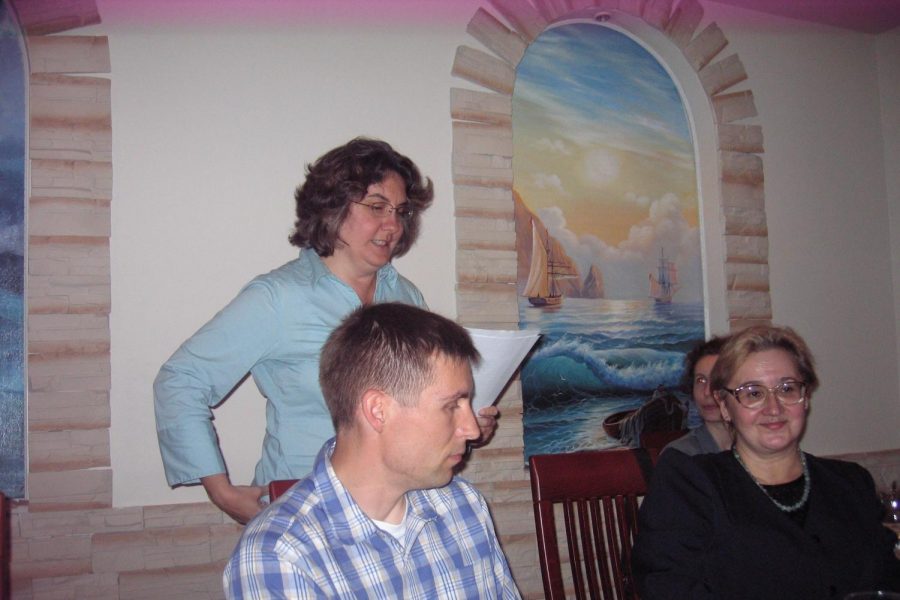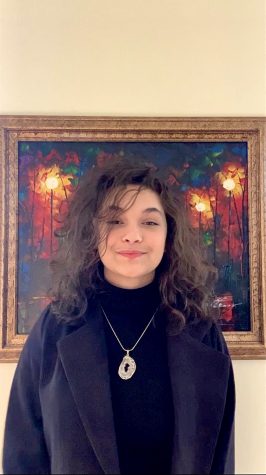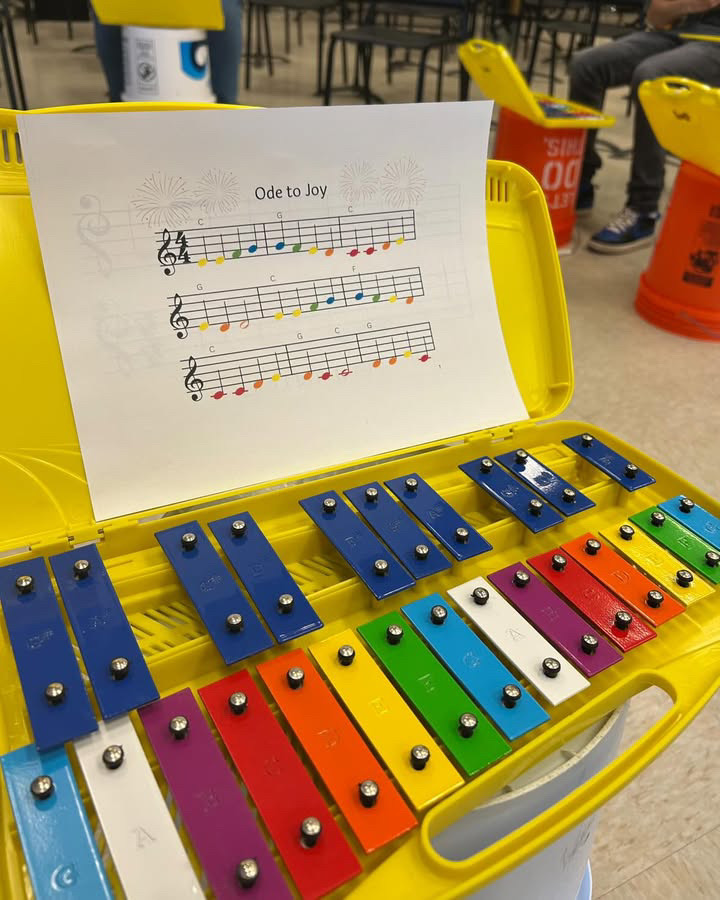“Soft-spoken and caring”: Michelle Quackenbush retires after 30 years of teaching
Russian, English teacher fell in love with Russian in high school, taught in Russia with the Peace Corps in the 90s
Former Russian and English teacher Michelle Quackenbush reads a humorous Russian story. Quackenbush retired this September to take care of her terminally ill aunt. She fell in love with the Russian language in high school; she took the class on a whim to complete the language requirement, she said.
November 16, 2019
Russian teacher Michelle Quackenbush may be soft-spoken in the classroom, but that doesn’t mean her passions are muted. To her students, she’s a beacon of the saying, “Do What You Love.”
She’s inspired students across two continents to find their own passions, no matter how unconventional those may be. Quackenbush herself is the epitome of unconventional: she’s a native New Yorker who fell in love with the Russian language during her senior year of high school.
“I procrastinated on getting my world language credit,” Quackenbush said. “Russian was offered my junior year. It seemed like a good way to complete the two-year graduation requirement.”
After 30 years of teaching — 20 of which she spent at Whitman — Quackenbush retired in September to take care of her terminally ill aunt. At Whitman, she taught Honors and Regular English 9, Honors and Regular 11, College Prep Reading and English 12 Regular. She also taught wrote the curriculum for all levels of Russian at Whitman.
New teacher William Webber picked up her English classes Oct. 25, and Lidia Krasnov, another new teacher, has been covering her Russian classes since Oct. 1.
It challenged me in a way that no other subject had. – Michelle Quackenbush
Quackenbush became the teacher sponsor for Whitman’s Russian club after 9/11. At the time, the FBI repeatedly aired ads asking for citizens who spoke foreign languages, particularly Russian, to work for the agency. One student, Coleman Griffin (‘05), took the ads to heart, proposed the idea for a Russian Club and asked Quackenbush to sponsor it. She hadn’t yet used her Russian skills for teaching in the U.S., but she was excited and eager to work with the students, she said. After a year of sponsoring the club, Quackenbush was ready to take the after school meetings to the next level: she wanted to create a Russian class. With support from former principals Jerome M. Marco and Alan Goodwin, Quackenbush began teaching Whitman’s first Russian course in 2004. In April 2005, her students took their first AP Russian exam.
At first, all six of her Russian levels were combined into one period. Although this made teaching difficult, Quackenbush learned to juggle teaching all six levels at the same time by working with the students individually while also following the curriculum with the class as a whole. After a while, the two beginner levels merged to become one first period class, and more advanced levels spread throughout the day in separate periods.
“About seven years ago, a parent thanked me for helping her child with Russian,” Quackenbush said. “She said it was the only class where her child fit in and felt the most valued. Language can be a game-changer for many students, academically and socially.”
After developing a love for the Russian language in high school, Quackenbush decided to major in Russian in college.
“It challenged me in a way that no other subject had,” she said. “Eventually, I learned to read short stories, the newspaper, great Russian literature — and to speak it.”
After majoring in Russian, Quackenbush wanted to study the language more in-depth abroad. In 1988, on the first of what would become many visits, she traveled to Russia, where she lived for one year. She remembers the hospitality she experienced and the community she met.
“The pull was the culture and the language together,” Quackenbush said. “Plus, if your host family knew you were interested in the history, they would go out of their way to immerse you in it. It’s just in their culture to make you feel welcome.”
Quackenbush lived in Russia during the fall of 1991 when Russia fell into hard times; the country experienced hyperinflation and famine. A can of Coca-Cola could cost 25 rubles in the morning and increase to 50 rubles by the afternoon. She said the country became “gloomy,” and pasta for every meal became the norm.
The pull was the culture and the language together. It’s just in their culture to make you feel welcome. – Quackenbush
Members of the community would set up one-man flea markets in the streets, and vendors crowded the streets to the point where cities created designated seller spots.
“It would be heart-wrenching to see the elderly, whose pensions were not enough, standing out in the freezing weather with a teacup or coat or other household item in hand to sell,” Quackenbush said. “A sold teacup or coat would probably only provide food or medicine for one day.”
Quackenbush returned to Russia in 1994 and stayed until 1996. There, she taught American Literature and English Composition while volunteering for the U.S. Peace Corps.
One of Quackenbush’s favorite memories from the Peace Corps was when several of her students received a one-year scholarship to study English abroad in the U.S. It was a proud moment for Quackenbush and life-changing for the students, since most had never left Krishev, their hometown, she said.
Because of her unique teaching experiences as a teacher, Quackenbush developed passion and creativity that inspired her colleagues at Whitman.
“Quackenbush is an extremely hard-working and detail-oriented person. She really is very creative,” English department head Linda Leslie said. “She innovated a flipped classroom process with her 11th grade class last year, where students chose not only their texts but their primary activities, group assignments and work pace.”
Quackenbush has a genuine passion for teaching, Tina Xia (‘19) said. Xia credits Quackenbush for helping her win the F. Scott Fitzgerald Literary Festival short story contest last year. Quackenbush read over and edited the story before Xia submitted it. Xia only had Quackenbush as a teacher for English 11, but that’s all Quackenbush needed to make a difference, Xia said.
“She is very soft-spoken and caring in the classroom,” Xia said. “One day after school, I stayed by to get some help. I remember her working so hard to fix her Russian curriculum to get it to its best for her students.”
In New York, Quackenbush is excited for more free time to pursue her hobbies, including banjo and guitar, but she’ll miss her students, she said.
“I’ve learned a few things through my 20 years of teaching at Whitman,” Quackenbush said. “I’ve learned that students truly do want to learn, no matter what school or university they attend. Each one wants to be heard and valued. As a teacher among those students, it’s important to me to make time to listen to each person who comes into the classroom, regardless of whether or not they like Russian or English.”












Chinara • Jul 26, 2022 at 10:44 pm
She taught us English at Bishkek Humanities University, Kyrgyzstan in 1994-1998.